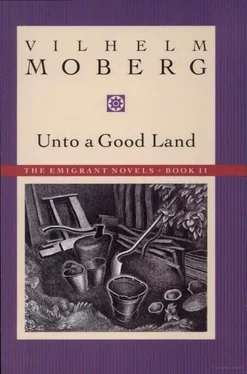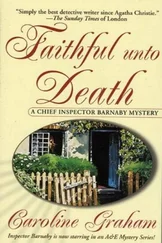Before he had time to ask for it, the postmaster-storekeeper behind the desk said to him: “I have a letter for you, Mister Nilsson.”
Mr. Abbott pulled out a long drawer under the counter and looked through a stack of letters until he found a small, square, gray-blue envelope: “Here it is! Yes, Mr. Nilsson.”
Karl Oskar’s face lit up, he recognized the letter: it was the kind of envelope they used at home. He stretched out his hand for the letter.
“Fifteen cents.” The tall Scot held the letter between his thumb and forefinger, but he did not give it to the Swede on the other side of the counter: “Fifteen cents, sir.”
“What mean you, Mr. Abbott?” Karl Oskar spoke his halting English. Why didn’t the postmaster hand over his letter? Did he want money because he had held it so long? What was the meaning of this charge?
“You have to pay fifteen cents in postage due, Mr. Nilsson.”
The postmaster of Taylors Falls still held the little gray-blue envelope between the thumb and forefinger of his right hand while he pointed with his left forefinger to some stamps on the letter. And Karl Oskar still stood with his hand outstretched for the letter from Sweden.
Then he thought he understood: the freight for the letter had not been paid. He must redeem it with fifteen cents. But he did not have even one cent.
“Yes, sir?” Mr. Abbott was waiting, expressionless. He held the letter firmly in his hand, as if afraid Karl Oskar might try to snatch it. Mr. Abbott was not a man to be taken by surprise.
“No — No—” The Swedish settler struggled with the language of the new land. “I can — can not today — no — have. . not one cent!” Karl Oskar pulled out his pockets — empty!
A trace of pity was discernible in the postmaster’s voice: “No cash, Mr. Nilsson? Sorry, I have to keep your letter.” And he replaced it in the drawer under the counter.
Karl Oskar, who had stretched out his hand for the letter from Sweden, had to pull it back empty — he thrust it into his empty pocket.
The storekeeper at the other side of the counter scrutinized him sharply: Karl Oskar looked foolishly at the floor. He could not redeem the letter he had come to fetch. . “No cash, Mr. Nilsson?” He had heard those words so many times, he knew what they meant. Cash —the word still sounded to him like the rustle of paper money, the fingering of piles of dollar bills. It was one word in the foreign language which he did not like, he could not get by it, he always bumped against it like a stone wall — cash! It was the word of permanent hindrance, the word for the settler’s greatest obstacle.
Mr. Abbott looked at Karl Oskar’s feet, at his shoes. To save his boots, already quite worn, Karl Oskar now wore his wooden shoes even for walks to the village. People in Taylors Falls stared at his feet in the wooden shoes, they had never seen such footgear. They apparently thought that people who wore wooden shoes were impoverished and wretched, he could see in Mr. Abbott’s eyes. The Scot pitied the wooden-shod settler, the poor Swede who did not have even fifteen cents to pay for his letter from the homeland.
If there was one thing Karl Oskar detested above all else, it was to be pitied. “All right!” he said, as if the letter did not concern him. And he felt he pronounced those words like an American.
“Sorry,” Mr. Abbott repeated. “But I have to keep the letter.”
News from Sweden, the first in a year, again lay hidden in the postmaster’s drawer. All that the settlers had wanted so long to know about their relatives at home — if they were well or ill, if all were alive, or if someone were dead — this long-awaited news was pushed back among the letters in the drawer. There it must remain until the fee was paid. Karl Oskar had nothing to reproach the postmaster with, it was not his fault if the addressee lacked the fifteen cents. The mail company granted no delay in payments. Mr. Abbott worked for the mail company, he did only his duty when he kept the letter.
Karl Oskar nodded a silent good-by and walked toward the door.
“Sorry!” Mr. Abbott said, for the third or fourth time.
His expression was still unchanged, but there was sadness in his voice. The postmaster was sorry for Karl Oskar, because he was unable to redeem his letter. Sorry, he heard that word often when Americans talked, it sounded as if they were constantly grieving for others. But he had sometimes heard the word uttered so lightly and unconcernedly that he wasn’t sure real sorrow was always felt. This time, however, he believed Mr. Abbott was genuinely sorry he had had to leave without the letter.
The day had been almost wasted. A walk to Taylors Falls and back was tiresome, his wooden shoes were heavy and clumsy, his feet always felt sore after a long walk. Must he now walk back nine miles without the letter?
But Anders Månsson lived in the village only half a mile away; he could borrow the fifteen cents from him, go back to Mr. Abbott’s post-office, and lay the money on the counter!
The Månsson fields lay deserted today, all was quiet. Fina-Kajsa sat in the sun outside the cabin, patching one of her son’s skin coats. She sat slumped and her glassy eyes wandered listlessly as if following something far away in the forest. She did not look at the work in her hands, she stared in front of her as if in deep worry; perhaps she was still brooding over the journey of disappointment she had undertaken to her son’s fine mansion in Minnesota; as yet she had not arrived.
Her cream-pitcher lips moved vaguely in answer as Karl Oskar greeted her and asked for Anders.
“He lies flat-back today.”
“Flat-back?”
“Yes. He lies flat on his back inside.”
Fina-Kajsa’s voice sounded hollow. Karl Oskar looked at her in surprise. Did Anders Månsson lie in bed on a weekday for no reason, without working? Or had something happened to him? “Is he ailing? Is that why—”
The mother gave no answer, she only pointed to the door meaningfully: Go inside! And he entered the tiny cabin into which the whole group of Swedish newcomers had packed themselves last year.
A strong, sweet odor struck him as soon as he was over the threshold and in the stuffy air of the cabin. It was a work day, the middle of the day — but Anders Månsson lay in his shirt on his bed, stretched out on his back, sleeping and snoring. The door creaked loudly on its un-greased hinges, and Karl Oskar clumped noisily on his wooden shoes, but the sleeper was not awakened by these sounds. Anders Månsson had not lain down for a light nap, he was sunk in deep slumber.
Karl Oskar went to the bed. As he leaned over the sleeper the rancid-sweet odor grew stronger. He discovered its source: his foot struck a wooden keg that lay overturned on the floor near the bed.
It was a whisky keg, rolling in a dark-brown wet spot on the floor, where some of the contents had run out. But not much had been wasted: Karl Oskar suspected that the keg had been practically empty when it was turned over. And the man who had emptied it now lay on the bed after his drinking bout, with open, gaping mouth, breathing noisily in deep jerky snores. His breath rattled in his throat, and his chest heaved slowly up and down. It seemed as if each new breath might choke him, stick in his throat, and be his last.
Anders Månsson was dead drunk today, a day in the middle of the week; he lay unconscious on his bed in full daylight, he lay flat-back as his mother had said. But his face bloomed red, his cheeks blossomed.
“Why are you so red in the face?” Fina-Kajsa had asked her son when they arrived last summer. And Karl Oskar remembered one time when he met Fina-Kajsa at Danjel’s; he had asked about Anders, and she had answered: “He lies flat-back at home.” He had wondered what she meant.
Читать дальше










